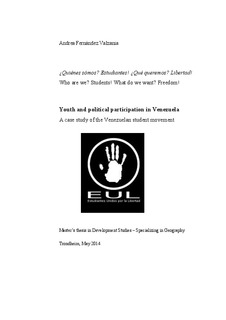| dc.description.abstract | Youth’s political participation in Venezuela has become very important in the last fourteen years due to the unstable economic, social and political context of the country. Youth have come together as a student movement in order to make the government aware that they were also political subjects who demanded more social justice and better governance from politicians. Student movements in Venezuela have always been pressure groups that arise in the political scene during critical political moments in the history of Venezuela. Most recently, the student movement of 2007 has become another political actor as they appeared in the political sphere to stop radical policies and to demand for more freedom and democracy for Venezuelans. The aim of this political generation is to reconcile both sides of the country, those who are against the government and those who oppose it, and they claim to do this by proposing a nonviolent struggle, using dialogue as a means for reconciliation and valorizing the role of human above any political ideology. This new political generation is the generation that intends to bridge both realities of the country in order to achieve social, material and spiritual progress in Venezuela.
The research is based on a month of qualitative fieldwork in Valencia, Venezuela between June and July 2013. In this period I was able to conduct in-depth interviews and two focus groups discussions that provided me with rich information about youth’s political participation in Venezuela during the last years. All the information I gathered provided me with a deeper understanding of the way young people practice politics in Venezuela. Using a generational politics and life-course politics approach helped me understand better the relationship between age, social change and politics, and how both approaches are interrelated when it comes to understanding young people’s political attitudes and behaviors. A humanistic view of politics emerges among youth; their claims have not so much to do with political ideologies, but instead with the defense and respect of human rights and values, such as solidarity, tolerance and dialogue. | nb_NO |
